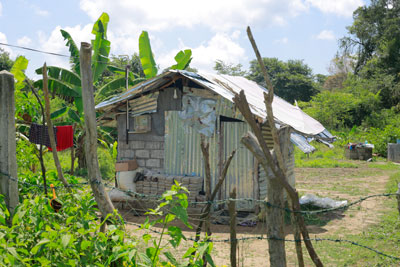News
Micro-finance borrowers in Vavuniya struggle to survive
View(s):- The pandemic, economic crisis and high interest rates causing severe hardship
By Yoshitha Perera
Udayamalar taken a loan of Rs. 30,000 from a micro-finance company prior to the Covid-19 pandemic to build a kitchen in her house. The loan required a monthly payment of Rs. 2,000, which she managed to pay through her daily earnings.

A collector from the Microfinance Company collecting installments
However, with the onset of the Covid-19 pandemic and the subsequent economic crisis, she found herself unable to make payments. As a result, the loan doubled and she is now struggling to repay it. The lock down imposed to control the spread of the virus made it difficult for her to find work, leaving her in a precarious financial situation.
In Vavuniya the Katkulam residents are predominantly daily wage earners struggling to make ends meet. Of the 118 families living in the village, only three members are employed in the state sector.
They were forced to flee their houses during the war and spent years living in the Sithampara Puram refugee camp at Poonthottam in Vavuniya before being relocated to cleared forestry land in Vavuniya.
However, the lack of job opportunities in the area continues to pose a significant challenge for the villagers. Many are forced to rely on low-paying daily labour to support their families, making it difficult to break the cycle of poverty.
Another distressing story has emerged from the rural village of Katkulam, where Sajeewan Dharshana, a mother of three has been struggling to make ends meet in the wake of the Covid-19 pandemic.

A half built house by a micro-finance borrower in Katkulam
Dharshana is also a daily wage earner and her husband has been unable to secure job, leaving the family in a precarious financial situation. In 2019, Dharshana took a loan of Rs. 60,000 from a micro-finance company to build an additional room in her house.
Despite her best efforts, Dharshana has been unable to pay the full loan. However, before the pandemic hit, she had paid a large amount and had only another Rs. 15,000 to pay. When the pandemic struck, Dharshana and other borrowers were advised by the micro-finance company officials not to go to the bank and deposit their installments.
“The micro-finance company officials did not come to collect the installments during Covid-19 lock down and now we are in a debt trap with a large number of installments,” she said.
The loan has now increased to a huge Rs. 80,000. Dharshana only recently discovered the interest rate for the loan was a staggering 36%, making it increasingly difficult for her to make the repayments. To make matters worse, the micro-finance company is now threatening to file legal action against her if she is unable to pay.
The micro-finance industry has come under scrutiny in recent years, with concerns raised over high-interest rates and aggressive collection practices. This case highlights the need for greater regulation and support for vulnerable borrowers, particularly during times of economic uncertainty.
Dharshana’s plight is a stark reminder of the devastating impact the pandemic has had on marginalised communities. The call to action is for policymakers and financial institutions to work together to provide much-needed relief to those most in need.
“The issue of high-interest rates charged by micro-finance companies has long been a concern for vulnerable borrowers, particularly during times of economic uncertainty,” University of Jaffna Senior Lecturer Ahilan Kadirgamar said.
He said while the Central Bank has attempted to regulate the industry through a code of conduct and an interest rate cap of 35%, many argue that more needed to be done to protect borrowers from falling into a debt trap.
Dr. Kadirgamar also said one alternative suggested was the strengthening of cooperative societies and other community-based credit systems.
“Unlike micro-finance companies, cooperative societies are owned by the community, and any profits made remain within the community. This can help to create a more sustainable and equitable financial system that benefits all community members,” he said.
Despite the efforts of the Central Bank to promote financial literacy and awareness among the people, many argue the real issue lies with the micro-finance companies themselves. Calls have been made for a ban on these companies that charge exorbitant interest rates, but so far, it was observed the authorities have been hesitant to take strict action. In 2018, former finance minister, the late Mangala Samaraweera, even referred to these micro-finance companies as “loan sharks.”
“In the North, the district secretaries have also acknowledged they are not doing enough to assist those who are struggling to make ends meet. It is clear more needs to be done to address this issue and protect vulnerable borrowers from exploitation,” Dr. Kadirgamar said.
A Vavuniya District Secretariat representative said the Government has implemented initiatives aimed at supporting entrepreneurial ventures as a means of addressing poverty in rural communities.
“To qualify for a grant to start a business, community members must first submit a proposal outlining their intended venture,” he said.
While this programme was designed to empower individuals to create sustainable income sources, some villagers had expressed concerns about the application process and the availability of resources to support new businesses.
The best way to say that you found the home of your dreams is by finding it on Hitad.lk. We have listings for apartments for sale or rent in Sri Lanka, no matter what locale you're looking for! Whether you live in Colombo, Galle, Kandy, Matara, Jaffna and more - we've got them all!

